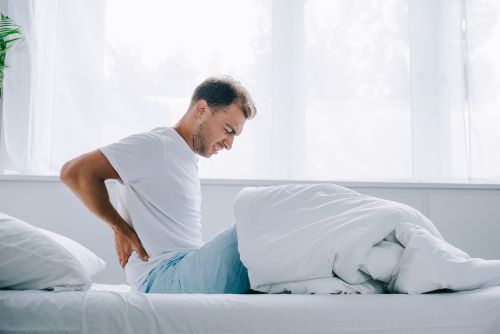
Many patients with back pain report sleeping problems. Some patients will awaken throughout the night because of pain. Here are some things you can do to sleep better:
- Not all sleeping positions will be the same. Experiment with different positions and find the one that is most comfortable.
- For low back pain, sleeping on your side might be more comfortable.
- If sleeping on your side, keep your low back in neutral position. This can be done by placing a pillow between your knees. This will maintain the normal curve of your spine.
- When sleeping on your side it’s important to keep your neck in neutral position. Use a firm low profile pillow, like the Posturepedic™ or Temper-Pedic pillows™, so that your head is aligned with the rest of your spine. A good tip is to keep both your ears equally atop the shoulders.
- If you sleep on your back try placing a pillow under your knee. This flexes the thigh and pelvis and helps maintain the low back’s natural curve.
- Keep your neck neutral if on your back. Avoid having the neck flexed forward or backwards by using a firm low profile pillow.
- Sleeping on your stomach can be hard on your back. If you’re a stomach sleeper, place a pillow under your pelvis and lower abdomen. A pillow under your head may cause strain if you are a stomach sleeper. It might be helpful to try sleeping without a pillow.
- To get out of bed, don’t jerk up from a lying position. Bend both knees and roll yourself out of bed, swinging your legs over the side of the bed while supporting yourself with your hand.
- Avoid caffeine and alcohol prior to bed, as these may interfere with your sleep.
- Avoid large meals shortly before sleep.
- Take pain medications prior to sleep.
- Prescription sleep medications may be helpful. Talk to your doctor.
- A soft mattress can make problems worse by having a lack of support.
- A stiffer mattress provides more support, but you’ll need to strike a balance with comfort in order to sleep well. In this writer’s experience, moderate stiffness mattresses like Posturepedic™ or Temper-Pedic™ work well.

